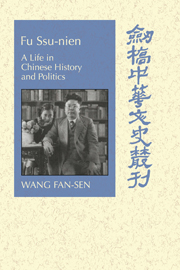Book contents
- Frontmatter
- Contents
- Acknowledgments
- List of Abbreviations
- Chronology
- Introduction: Fu Ssu-nien and Post-1895 Intellectual Trends
- 1 Fu Ssu-nien's Early Years
- 2 The Shaping of a New Historical School
- 3 Toward a Theory of Plural Origins of Chinese Civilization: Hypotheses on Ancient Chinese History
- 4 Contra-Introspective Moral Philosophy
- 5 The Burden of the May Fourth Mentality
- 6 Statism and the Later Days of a May Fourth Youth
- Conclusion: The Defeat of a May Fourth Youth
- Appendix I A Fragment from a Short Story Attacking Ku Chieh-kang
- Appendix II A Transcript of a Conversation between Fu Ssu-nien and Ch'en Pu-lei
- Glossary
- Bibliography
- Index
2 - The Shaping of a New Historical School
Published online by Cambridge University Press: 01 February 2010
- Frontmatter
- Contents
- Acknowledgments
- List of Abbreviations
- Chronology
- Introduction: Fu Ssu-nien and Post-1895 Intellectual Trends
- 1 Fu Ssu-nien's Early Years
- 2 The Shaping of a New Historical School
- 3 Toward a Theory of Plural Origins of Chinese Civilization: Hypotheses on Ancient Chinese History
- 4 Contra-Introspective Moral Philosophy
- 5 The Burden of the May Fourth Mentality
- 6 Statism and the Later Days of a May Fourth Youth
- Conclusion: The Defeat of a May Fourth Youth
- Appendix I A Fragment from a Short Story Attacking Ku Chieh-kang
- Appendix II A Transcript of a Conversation between Fu Ssu-nien and Ch'en Pu-lei
- Glossary
- Bibliography
- Index
Summary
No matter how ambivalent Fu himself felt, at a time when young people believed that the tao had already shifted from Confucian texts to Western books (hsi-shu), he was very much envied by his contemporaries. In a letter from Ku Chieh-kang to Fu Ssu-nien, Ku confessed his frustration at his inability to grasp just “what is learning” (she-mo shih hsüeh-wen); his inability to read foreign books was equivalent to being unable to gain access to the new tao. Ku contemptuously announced that there was not a single chapter in Chinese books worth reading. It was also true for Fu Ssu-nien that nothing other than Western learning could be called true learning (hsüeh-wen), and he described himself as extremely hungry for “learning.” Given this scenario, when Fu and five other members of the New Tide Society went abroad to study, they were nicknamed “Five Ministers Sent Abroad” (Wu-ta-ch'en ch'u-yang), reminiscent of the five ministers of the late Ch'ing who went abroad to study the Western constitutional system.
Studying in London and Berlin
Fu characterized his time in London as yu-hsüeh, or general study, not study in pursuit of a degree. But when he left China in the winter of 1919, his plan was probably to get a degree from a Western country if possible. Fu first registered in the Department of Psychology at the University College of London University. He originally planned to register as an M.A. student, but on the advice of Charles E. Spearman, the department chair and a pioneer in experimental psychology, Fu decided to take courses at the undergraduate level.
- Type
- Chapter
- Information
- Fu Ssu-nienA Life in Chinese History and Politics, pp. 55 - 97Publisher: Cambridge University PressPrint publication year: 2000



